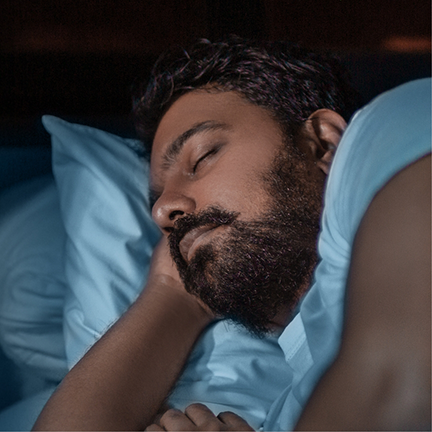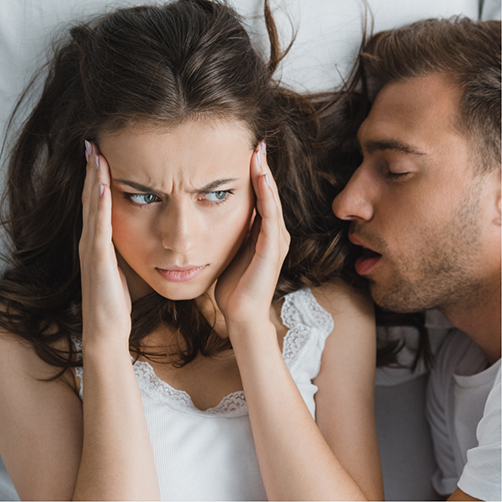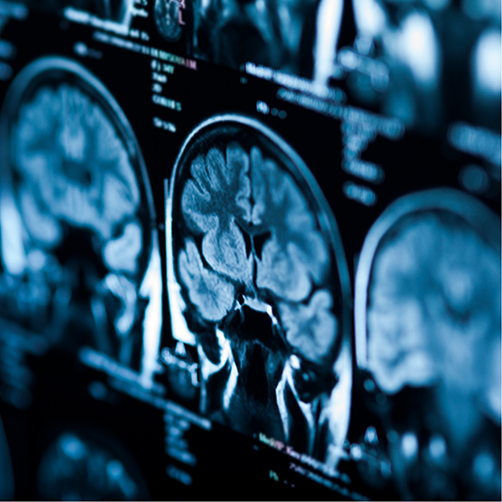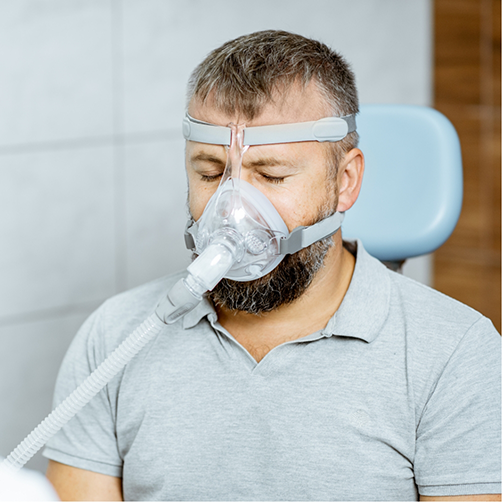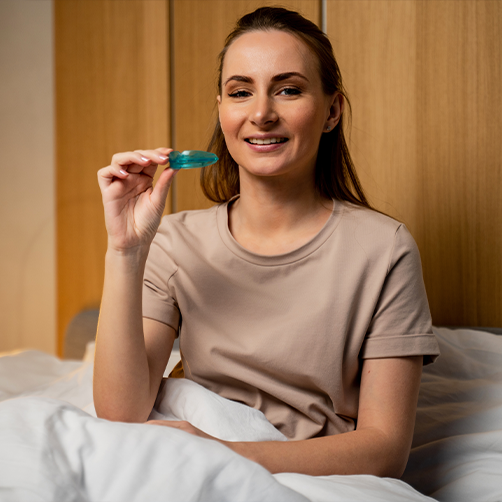In a sense, you’re lucky if you’ve received a diagnosis for sleep apnea – because you now know exactly what has been depriving you of your much-needed rest and how to go about addressing the issue! With sleep apnea, daytime fatigue can have a serious impact on your quality of life. Even More serious are the long term health issues tha can result from neglecting treatment. These include diabetes, an increased risk of stroke, and even an increased risk of heart attack.
Dr. David Lloyd and our team at Serene Sleep Solutions in Daytona Beach are here to reduce your risk of all these problems while ensuring that every morning when you wake up, you feel the difference that quality sleep can make.
The Basics of Sleep Apnea
Sleep apnea refers to a condition that causes an individual to frequently wake up during the night due to the interruption of airflow. It occurs when breathing stops for 10 or more seconds at a time; these episodes, called “apneas”, can occur hundreds of times in a given night. When breathing pauses, the brain sends signals to the rest of the body, briefly waking it from sleep and preventing the normal and most beneficial stages of sleep. Needless to say, this can lead to sleep debt; when the body and brain cannot complete a full sleep cycle each night, you’ll feel it more and more with each passing day.
Beyond sleep loss, this chronic issue can lead to all kinds of conditions that detract from your overall quality of life, including daytime fatigue, memory problems, moodiness and irritability, and more. It can also trigger issues that impact your cardiovascular and respiratory systems.
Learn More About Obstructive Sleep Apnea
What Causes Sleep Apnea?
Sleep apnea can develop due to a very wide variety of reasons, and it can also be categorized into a couple of different types. Obstructive sleep apnea (OSA) is the most common type of sleep apnea. It refers to when the airway is either too narrow, blocked, or otherwise restricted to some degree. Central sleep apnea, or CSA, is often linked to neurological problems that cause the body to have trouble breathing properly. However, no matter which type of sleep apnea is being dealt with, certain factors like weight, lifestyle, and family history can all play a contributing role in the condition.
Common Sleep Apnea Symptoms
Not all sleep apnea symptoms are easy to identify, especially since many can be linked with other potential problems. However, if you or your partner notice one or more of the following symptoms, consider calling our Daytona Beach office for help:
Loud or chronic snoring
Choking or gasping
Waking in the morning feeling unrefreshed
Memory problems or trouble staying focused
Being tired during the day
Morning headaches
Dry mouth or sore throat in the morning
Irritability and mood swings
Waking up frequently at night to go to the bathroom
Grinding or clenching your teeth at night
Impotence
Take Our Sleep Apnea Quiz
The Dangers of Sleep Apnea
Consistent, restful sleep is the secret to enjoying a happier and healthier life. It can benefit your physical, mental, and emotional health. However, the presence of untreated sleep apnea can lead to numerous long-term issues, including:
-
Heart disease
-
Stroke
-
Diabetes
-
High blood pressure
-
Obesity
-
Dementia/Alzheimer’s
-
Depression
-
Sexual dysfunction
-
Cancer
How Is Sleep Apnea Diagnosed?
A sleep study, sometimes referred to as a polysomnogram, is the only definitive way to tell whether or not you suffer from sleep apnea. These tests are completely painless and non-invasive. They can be conducted at a separate sleep laboratory or at home using an ambulatory sleep study device.
Our office is excited to offer at-home testing kits; we will review this option with you during your appointment, but don’t hesitate to contact us with any questions. If you do not want to undergo a study in a lab that may involve CPAP, then the take-home sleep study may be a better option for you. Either way, the results will give a definitive diagnosis. From there, Dr. Lloyd and our team at Serene Sleep Solutions can help you find the treatment that is right for you!
How Is Sleep Apnea Treated?
There are several methods used to treat sleep apnea, but what most people think of first is CPAP (continuous positive airway pressure) therapy, which involves the use of a facial mask that’s worn to sleep to keep the airway open. Here at Serene Sleep Solutions, Dr. Lloyd is excited to provide custom-made oral appliances as an alternative. Comfortable, portable, easy to use, and completely silent, countless patients are achieving better sleep with these incredible devices!
Learn More About Oral Appliances
Benefits of Sleep Apnea Treatment
Even though sleep apnea might occur while you’re sleeping, the benefits of treatment extend throughout the night and the day. You’ll find that you have far more energy to conquer the day, and you’ll be far less likely to fall asleep while sitting at work, in class, while driving, or even when you’re at home trying to enjoy a hobby. Better yet, your overall health will also be significantly improved, as your risks of conditions like heart disease and diabetes will be lowered. Among other things, you’ll simply feel less irritable and better able to enjoy life!
Sleep Apnea FAQs
Why Should I See a Dentist for Sleep Apnea Treatment?
Dentists are experts in the upper airway. They understand how various structures can affect airflow, and many dentists, including Dr. Lloyd, have completed extensive additional training in the assessment and treatment of obstructive sleep apnea (OSA). Indeed, visiting a qualified dental practice for sleep apnea care allows for a personalized approach tailored to your needs.
Plus, dentists are qualified to offer oral appliance therapy, which is better tolerated than traditional forms of treatment, such as CPAP therapy.
Does Everyone Who Snores Have Sleep Apnea?
Not everyone who snores suffers from sleep apnea. Snoring can occur due to several factors, including nasal congestion or anatomical abnormalities, and does not always indicate a serious medical condition. However, persistent and loud snoring is sometimes a sign of obstructive sleep apnea, especially when it is accompanied by pauses in breathing, daytime fatigue, or morning headaches. (It is also important to note that some individuals with sleep apnea do not snore at all.)
In our Daytona Beach practice, we encourage individuals who snore regularly to undergo an evaluation. Early assessment allows us to determine if an underlying sleep disorder is present.
Can I Diagnose Sleep Apnea on My Own?
No, it is not possible to diagnose sleep apnea on your own. While you may notice signs and symptoms such as daytime sleepiness, morning headaches, or frequent waking during the night, a professional evaluation via a sleep study is necessary for an accurate diagnosis.
If you believe you have OSA, speak to your primary care practitioner about your concerns. If you have a sleep journal or data from a smart device that tracks the quality of your sleep, bring it to your appointment. Based on the available information, your doctor can determine whether you need a sleep study.
Will My Sleep Apnea Go Away If I Lose Weight?
Weight loss can positively impact sleep apnea, particularly for those with excess weight around the neck and throat. Reducing body weight may decrease the severity of symptoms or, in some cases, lead to remission. However, weight loss alone does not guarantee complete resolution of sleep apnea for every individual.
It is important to understand that sleep apnea has multiple causes, some of which are unrelated to body weight. Our dental practice offers oral appliance therapy to address airway obstruction, regardless of your weight. We will work with you to develop a comprehensive treatment plan that incorporates lifestyle modifications alongside oral appliance therapy for optimal results.
How Can I Travel with Sleep Apnea?
Traveling with sleep apnea requires thoughtful preparation, but oral appliance therapy can make the process much easier. Oral appliances are small, portable, and discreet, allowing you to maintain your treatment regimen without the need for bulky equipment.
Other things you can do for successful travel with sleep apnea include:
- Schedule time to get enough rest.
- Avoid overexerting yourself while traveling.
- Do not eat too close to bedtime, and do not drink alcohol too close to bedtime.
- Try to stick to a regular sleep schedule.

